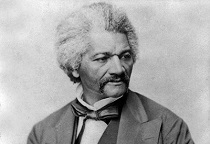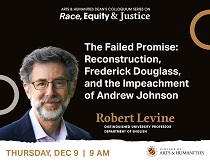BY ROBERT S. LEVINE
Robert S. Levine is Distinguished University Professor of English at the University of Maryland, College Park, and author of The Failed Promise: Reconstruction, Frederick Douglass, and the Impeachment of Andrew Johnson, available now from W. W. Norton & Company.
On Jan. 3, 1867, nearly two years after the end of the Civil War, Frederick Douglass stood before a full house of hundreds of African Americans at Philadelphia’s National Hall. He had been invited to speak in a Black lecture series organized by William Still, famous for his work on the Underground Railroad. As recounted by the Philadelphia Daily Evening Telegraph, the celebrated African American singer Elizabeth Taylor Greenfield performed several arias before Douglass’s introduction. Douglass then took the stage to speak on the “Sources of Danger to the Republic.” The Telegraph reported that he “was frequently interrupted by applause, and evidently made the best effort of his life.”
“Sources of Danger to the Republic” is indeed one of Douglass’s greatest speeches, and it deserves to be better known for its ruminations on the precarious state of democracy in post-Civil War America. Douglass delivered the speech in the midst of the battle over civil rights for Black people, addressing the threat posed to the nation by a racist President who refused to give them the full rights of citizenship. Douglass’s warning about antidemocratic authoritarianism during the early years of Reconstruction resonates in our own time as well.
The “Sources of Danger” speech was prompted by the reactionary policies of Andrew Johnson, who assumed the presidency on April 15, 1865, after Abraham Lincoln’s assassination. Shortly after taking office, Johnson pardoned former Confederate leaders, and over the four years of his presidency he vetoed all legislation that sought to expand the rights of African Americans. (Many of those vetoes were overturned by the Radical Republicans and their allies.) In particular, Johnson opposed measures that granted African Americans the right to vote. His reactionary policies contributed to massacres of Black people in Memphis and New Orleans during the spring and summer of 1866. Appalled by the killing of over 100 Black people in those cities, Douglass linked the murders to the disempowerment promoted by Johnson. “Disenfranchisement means New Orleans; it means Memphis,” he said. In this way Douglass called attention to the always simmering possibilities for violence that accompanied the suppression of voting rights.
But Douglass was also angry at the Radical Republicans, who claimed to support African Americans, but attempted to stop Douglass from attending a public meeting of Republicans in September 1866 because they didn’t want their party to be perceived as “Black.” Douglass was also distraught that the Republicans’ proposed Fourteenth Amendment, which gave Blacks birthright citizenship, failed to include the right to vote. Without the vote, Douglass bitterly remarked, “my citizenship is but an empty name.”
Click here to read more.






